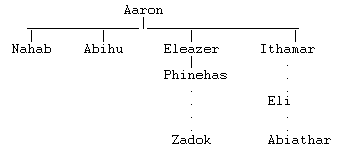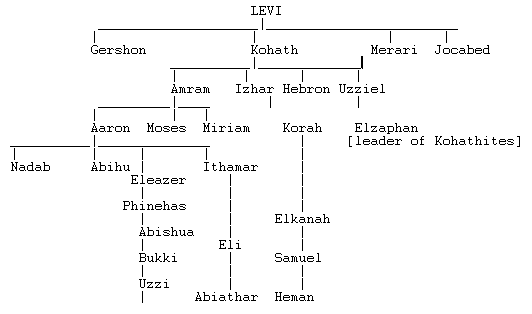|
 |
August
8
|
 |
|
|
|
Reading
1 - 1Kings 2
Click
here to Listen
|
v.3
- It is noteworthy that David's final words to Solomon were not about how
to govern and rule the people, but about keeping the charge of the Lord
God, in terms of his statutes and commandments and judgements and testimonies.
He then goes on the point out the benefits of this attitude in terms of
the blessings from God. We each, as kings and priests to be, do well to
take this exhortation to ourselves too. Deut.29:9,
Josh 1:7, 22:5, 2Sam.8:6,14.
Peter Cresswell |
|
v.4
- We all know that the fulfilment of the promises of God is sure, but we
also know that our involvement in that fulfilment is by His grace and at
His judgement. Each of us would want to leave a message like this at our
end. I suppose David was as realistic as we would be and would recognise
that after this death there would be little chance of improvement. We must
not give up however, or become despondent - it is individuals in whom God
is interested, and we don't know who or where they are, so let us, like
David, stay positive to the last and never stop preaching the word.
Peter Cresswell |
|
|
The removal
of Abiathar from being priest.- At this time it seems that there were
two lines of priests working. Abiathar and Zadok. Abiathar had revolted
against Solomon as future king. Zadok had upheld the choice of Solomon.
[see
1 Kings 1:7-8]
therefore Abiathar was removed [1
Kings 2:27]
and Zadok installed as priest [1
Kings 2:35]
The
genealogy is thus.

The
removal of Abiathar is the fulfilment of 1
SAM 2:31
The
Sons of Korah

Peter Forbes
|
|
2
We may wonder why David delayed right to his death before anointing Solomon
to reign after him. This delay is even more surprising when viewed against
the uprising of Absalom and Adonijah. Maybe David delayed because he thought
of the promises (2
Samuel 7:12). He anticipated that Solomon would come to throne after
his death in fulfillment of the promise.
Peter Forbes
|
|
:12
sat upon the throne of David his father passes into Biblical use to speak
of the position of Messiah (Isaiah
9:7, Luke 1:32) So whilst Solomon was not Messiah he prefigured him.
Peter Forbes
|
|
|
Reading
2 - Jeremiah 29
Click
here to Listen
|
v.7
- The peace that God is promising here is not in Babylon, but in prayer.
Obvious lesson for us in the Babylon in which we live. Rom.13:1,5,
2Pet.2:13-17.
Peter Cresswell |
|
v.5,6
- The divine message was clear - This was a long term punishment. They were
to settle down and they were to continue to increase and multiply. It was
no good hoping for release. There was none coming in the near future. We
live today in an age where we look constantly for immediate gratification
and expect only short term chastening. Here we see that our entire lifetime
is 'short term' to God, and we start to appreciate the vast scale of eternity.
This helps all to stay in perspective. Let us listen for and respond to
the divine plan that God has for each of us and shoulder that burden, whatever
it be, in faith and with joy and hope.
Peter Cresswell |
|
v.14
- Amidst the doom of captivity the prophet speaks of a time of restoration
And return to the theme even after the desolation of Jerusalem [Lamentations
2:14] The contemporary
prophet to Jeremiah also looks to that time of restoration. [Zephaniah
2:7] The promise
that they would be brought again draws on the words of Israel to Joseph.
[Genesis
48:21] and echoes
the words of the contemporary prophet [Zephaniah
3:20]
Peter Forbes |
|
29:10
The 'good word' of the return from Babylon is picked up by Zechariah (1:13)
to show them how Jeremiah's prophecy had been fulfilled.
Peter Forbes |
|
:18
'removed … earth Deuteronomy 28:25
'among … them' Deuteronomy 28:37
Peter Forbes |
|
PRAY
FOR KINGS
There is one instruction to pray that is often sadly neglected among Christians.
Paul mentions it in 1 Timothy 2, where he says, "I urge then that prayers,
intercession and thanksgiving be made for everyone - for kings and all those
in authority, that we may lead peaceful; and quiet lives in all Godliness
and holiness." (1
Tim 2 v 1 - 2) For my part, my most common prayers are for myself and
my needs, for my family, my Sunday School, my Church, and my friends, but
praying for kings and all those in authority often slips my mind. Very seldom
do I pray for the government, the prime minister, local government or anyone
else in authority.
Jeremiah gave the same message to the Jews who had been taken to Babylon.
He said, "Seek the peace and prosperity of the city to which I have carried
you into exile. Pray to the LORD for it, because if it prospers, you too
will prosper." So let us resolve to improve the quality and time of our
prayers by praying for the people that God has set over us. Prayer, after
all, is the most powerful force we have in our grasp to make a Godly influence
on our world. So let us use it in all its power as we pray for kings and
all those in authority.
Robert
Prins |
|
|
Reading
3 - Mark 3
Click
here to Listen
|
v.5
- There are clearly times when anger is not sin, but is caused by grief
at the waywardness of humankind. This grief is shared by God. Gen.6:6,
Judges 10:13-16, Psa.95.8-10.
Peter Cresswell |
|
v.
1 -
In Mark the phrase 'the synagogue' occurs on the following occasions
Mark
1:21 29 3:1 5:22 36 38 6:2
From Mark
1:21 it is clear
that the synagogue first referred to is in Capernaum. It seem likely, therefore,
that all the times that 'The
synagogue' is mentioned in Mark it is speaking about events in Capernaum
even though. Mark
1:39 informs
us that he preached in a number of synagogues in Galilee.
Peter Forbes |
|
|
Mark seems to be careful to record a number of occasions when the Pharisees
came to entangle Jesus. Here is a list 2:16,
24 3:6 7:1 10:2 12:13
So we
see that the Pharisees were involved in a long term offensive against
Jesus. On reviewing their 'comrades' in these offensives we will see that
they were non too particular as to who they worked with as they were willing
to work with those whose political and religious views they disagreed
with.
Peter Forbes
|
|
Whilst
in 1:32
the people waited until the end of the Sabbath to come and be healed Jesus
on this occasions heals the man with the withered hand during the Sabbath
day. Jesus is forcing the pace - confronting the leaders with their prejudiced
errors.
Peter Forbes |
|
| Jesus
was the man in v27
who had bound the strong man. Jesus's point is that if he was busy spoiling
the strong man's house (i.e. casting out demons) then he must have already
bound the strong man! (i.e. Satan). The evidence was before their eyes that
here was a man who had subdued the flesh (bound Satan), and was living by
the spirit. For this reason it was a blasphemy for them to accuse him of
having an unclean spirit, because it was a blasphemy against God's spirit.
A further
point to ponder
What
kind of perverse people would do what the Pharisees did in v1-6,
denying a man of healing for their own ends? Yet the anger of Jesus was
not because of this, but because of the "hardness of their hearts".
It was at the frustration of not being able to save these sinners who
so desperately needed saving! (Matt
23v37) How refreshing it must have been for him to encounter a Gentile
multitude who allowed him to heal them to his hearts content! (v7-10).
Robin
de Jongh
|
|

